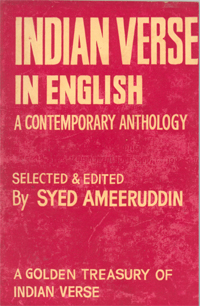Indian Verse in English
 INTRODUCTION
INTRODUCTION
Considering the almost universal loss of interest • in poetry in this age of scientific progress, the growing demand for Indian Verse in English, in India, appears as a somewhat unusual phenomenon. Bm there are many intrinsic and social reasons to account for the growing popularity of Indian poetry in English.
After the independence, especially during the fifties, the situation has completely changed with the promotion of Hindi as the prime official language and the demotion of English to the associate status in India. This grave situation is one of the main reasons-that has brought the Indian poets in English close to one another, rededicate their faith in English as a language that could play a creative role in Indian literature and to produce poetry in no way inferior to or less Indian in content than that being written in the other Indian languages. In the seventies things have changed. Indian Poetry in English has been accepted and is being critically examined by an increasing number of both Indian and foreign scholars It is being taught in almost all the Universities in India, and at an increasing number of Universities the world over. This may be attributed as one of the main reasons for its growing popularity at home and for its increasing interest all over the world.
This anthology contains poems by poets of the fifties like Nissim Ezekiel, P. Lai, V. K. Gokak and Krishna Srinivas who have become the leading luminaries of our time. Poets of the early sixties like Kamala Das, A, K. Ramanujan, R. Parthasarathy and Monika Varma who have made a mark in shaping and giving a new individualistic form and style to our growing — Indian poetry in English and poets of the later sixties like Pritish Nandy, Jayanta Mahapatra, Shiv K. Kumar, Keki N. Daruwalla, Gauri Desh-pande and Rabindranath Menon who have taken the banner of Indian Poetry in English a step further-installed it on a firmer base. The early seventies have produced a bumper crop. A brilliant galaxy of new and young talents has emerged with greater confidence and new hope. Those who have done yoeman service with a greater zeal in popularising the new and exciting frontiers of Indian Poetry, in English are— Syed Ameeruddin, Subhas C. Saha, Suga, Aripirala Viswam, Pranab, I. K. Sharma, Bejan Daruwalla, Mukund R. Dave, Baldev Mirza, Anna S ujatha Modayil and Rohini Gupta.
There is a wide variety in this anthology. I have included the works of poets—belonging to the 50's 60*s aud 70's who are still actively engaged in making this movement grow and bear fruits. Selec-tion of poems is a diffiuclt task.
I have selected the poems in this anthology. With a view to demonstrating the richness and universality and above all the great diversity and range of themes in the Indian Poetry in English today.
The main purpose of bringing out this anthology is to fulfil the long felt need of having a complete, uptodate and all comprehensive anthology, which could project objectively the detailed panoramic view of Contemporary Indian Verse in English. Moreover it attempts to reveal the originality of the poets and their sincere striving to press their own individuality and cultural identity, the basic 'Indianness'
So far, a number of anthologies have been published. But no anthology is complete or fair in its representation. Some are too narrow in scope, some too lavish in perspective, some have become outdated and some have been restricted to a select few. There* fore, my humble endeavour here is to present a most comprehensive and representative anthology of our time. This is so far the first of its kind in India, in the sense, leading poets in English from all the regions of this great country are represented. This has been particularly designed to serve as an up-to-date and authentic textbook as well as reference book to poetry lovers, scholars, and students of Indian Writing in English all over the world. Finally this anthology aims to give a vivid account of the tradition, growth, achievement—and historical perspective of the Contemporary Indian Verse in English.
I am highly indebted to poets who are included in this anthology for their valuable contribution and enthusiastic co-operation.
I am also grateful to P. Lai, V. K. Gokak, Krishna Srinivas, Pritish Nandy and Pranab Bandyo-pathyay for their valuable suggestions in bringing out this anthology.
In conclusion, I would like to quote Pritish Nandy— The stage seems now set for some excitement in the seventies. More experimental work is being done* more young poets joining the fray and despite the claims of the language chauvinists, the interest in Indian Writing in English is certainly increasing. Things have changed over the last two decades. Much better poetry is being written today than ever before.' I wholeheartedly endorse the statement of Pritish Nandy and endeavour sincerely to present in this anthology the most exciting and the best poetry that is being written today.
— SYED AMEERUDDIN
( Book Description - INDIAN VERSE IN ENGLISH - Published by POETS PRESS INDIA - Chennai - 41 Poet's Poetry Collection in 145 pages )









